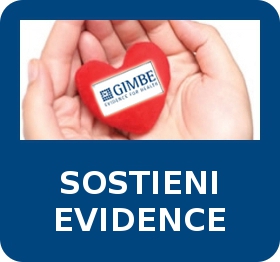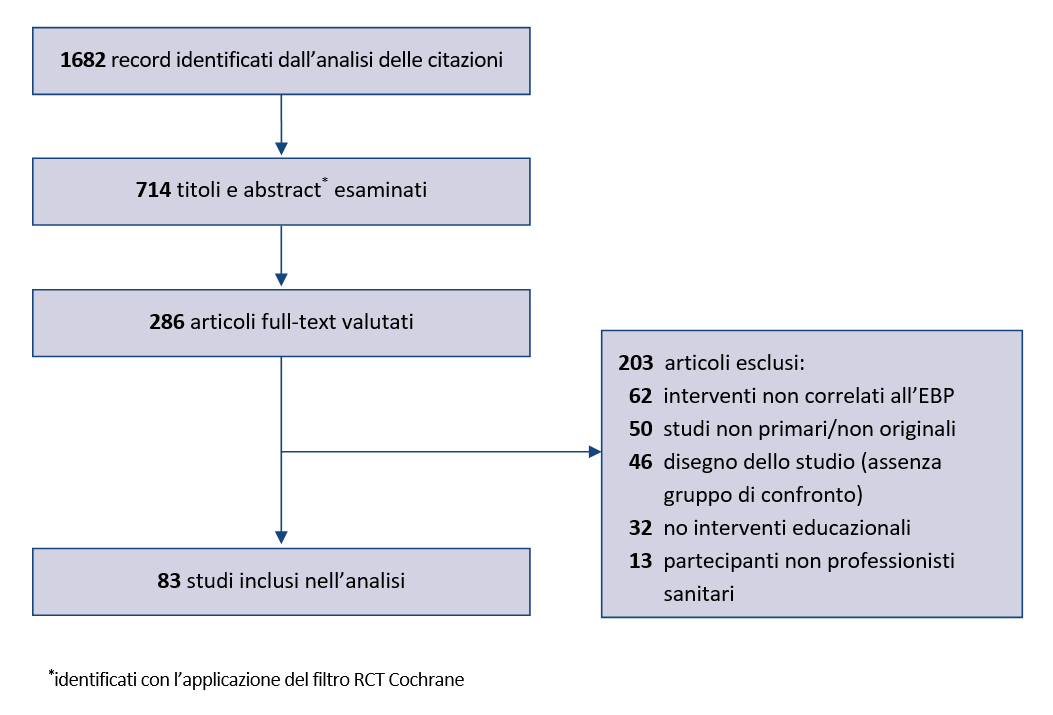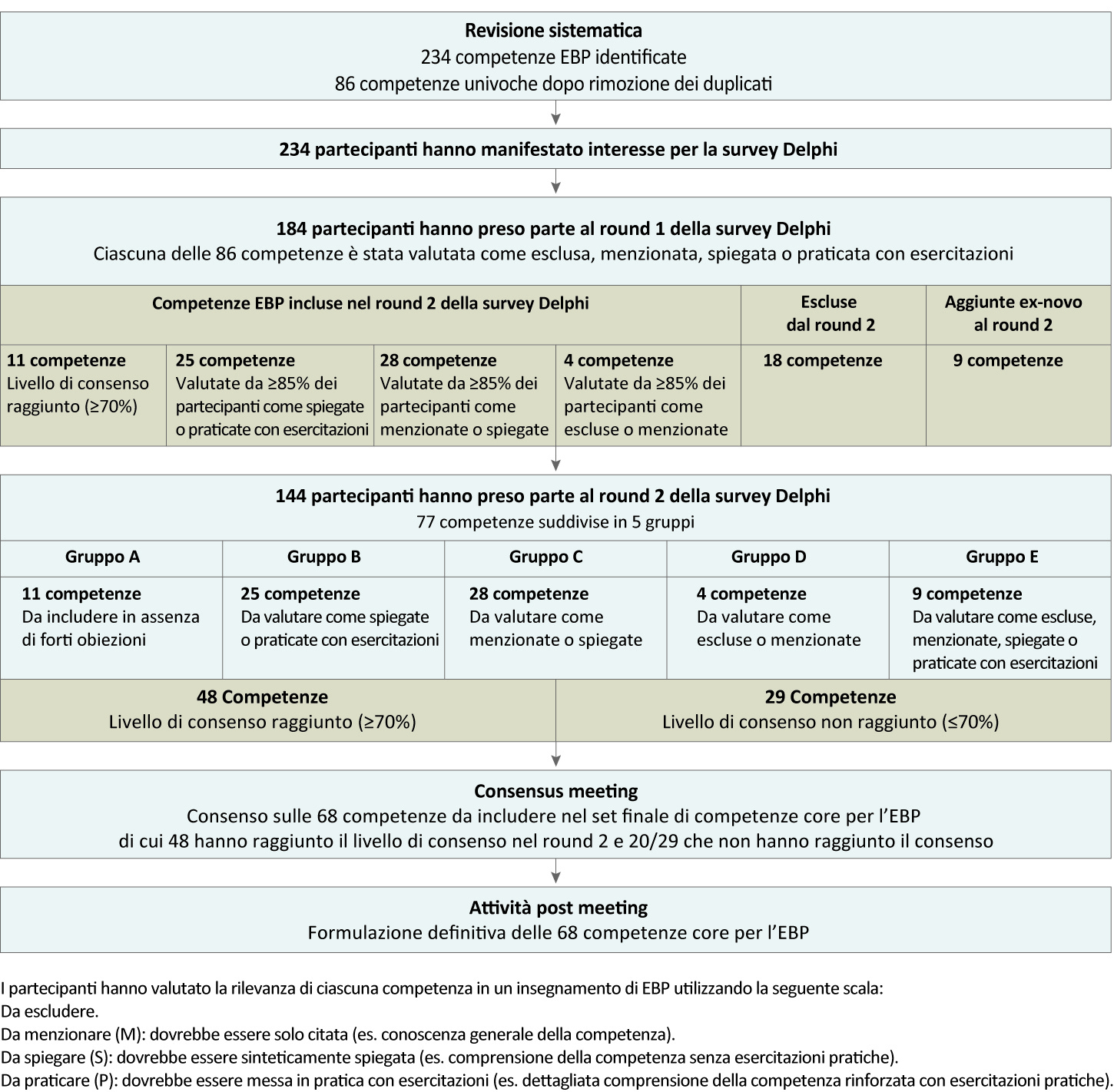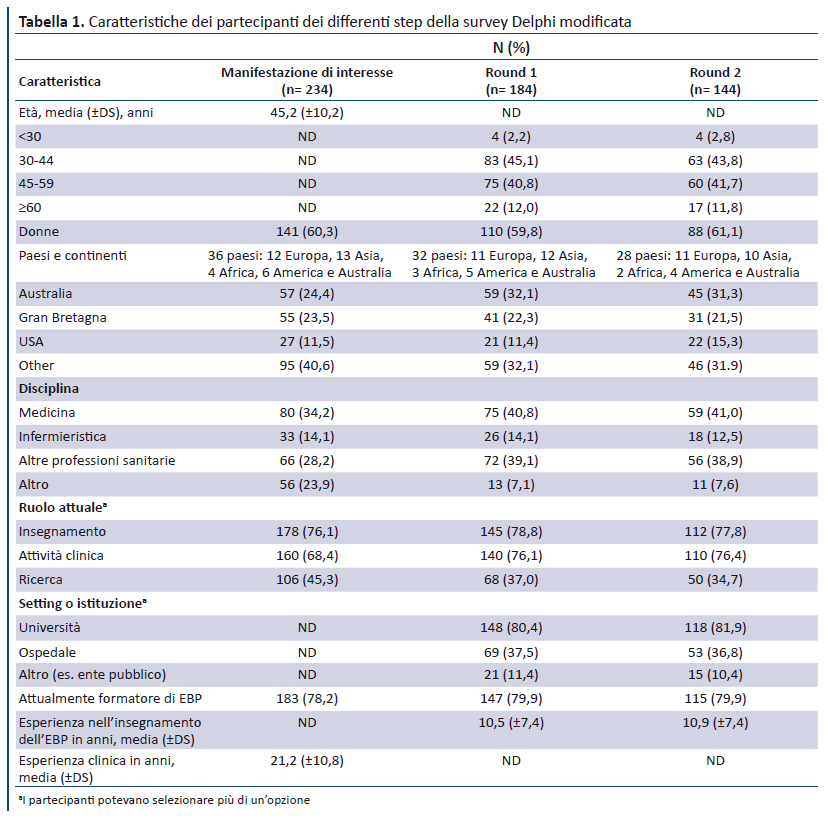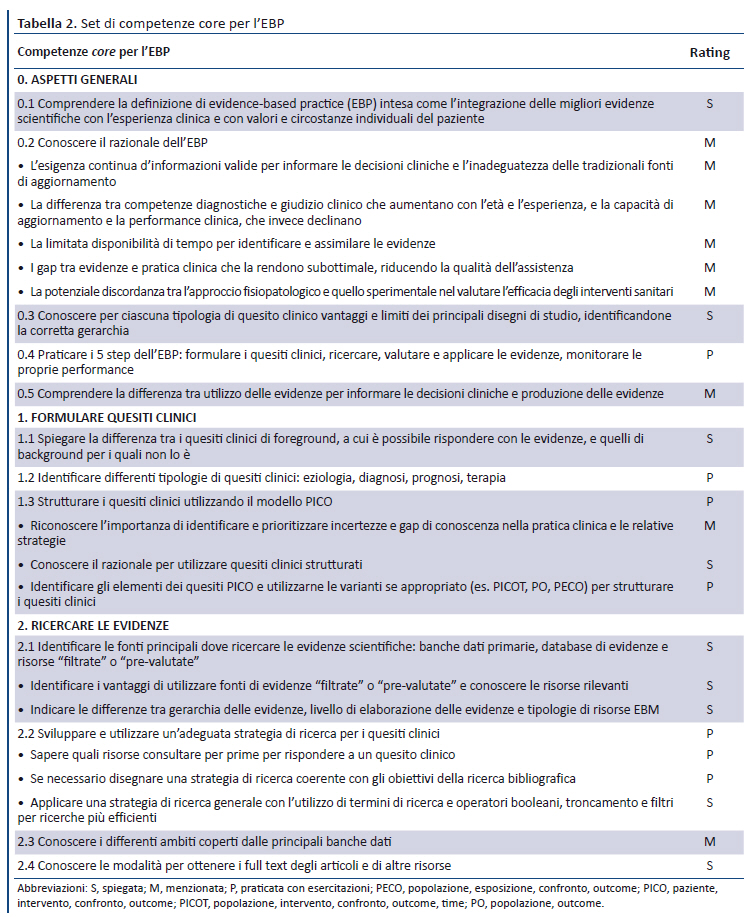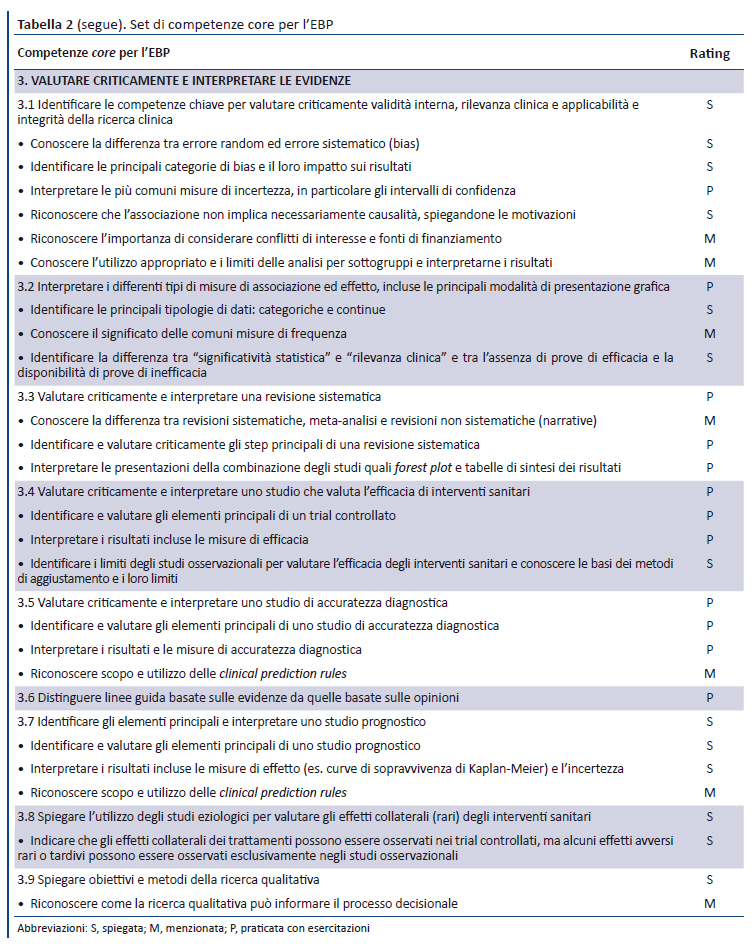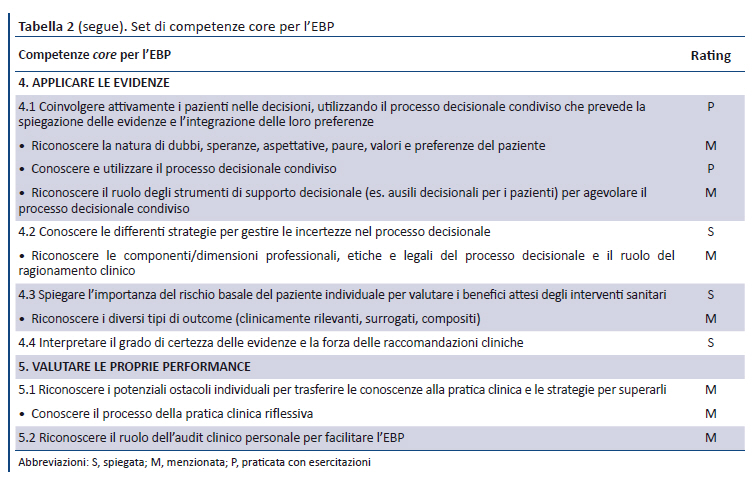Guidelines & Standards
Evidence-based Practice: le competenze core
per tutti i professionisti sanitari
Loai Albarqouni, Tammy Hoffmann, Sharon Straus, Nina Rydland Olsen, Taryn Young, Dragan Ilic, Terrence Shaneyfelt, R. Brian Haynes, Gordon Guyatt, Paul Glasziou
Evidence 2019;11(6): e1000198 doi: 10.4470/E1000198
Pubblicato: 28 giugno 2019
Copyright: © 2018 Albarqouni L et al. JAMA Network Open. Questo è un articolo open-access, distribuito con licenza Creative Commons Attribution, che ne consente lâutilizzo, la distribuzione e la riproduzione su qualsiasi supporto esclusivamente per fini non commerciali, a condizione di riportare sempre autore e citazione originale.
1. Straus S, Glasziou P, Richardson WS, Haynes B. Evidence-Based Medicine: How to Practice and Teach It. London, UK: Churchill Livingstone; 2010.
2. Haynes RB, Devereaux PJ, Guyatt GH. Clinical expertise in the era of evidence-based medicine and patient choice. ACP J Club 2002;136:A11-A14.
3. Frenk J, Chen L, Bhutta ZA, et al. Health professionals for a new century: transforming education to strengthen health systems in an interdependent world. Lancet 2010;376:1923-1958.
4. Institute of Medicine (US) Committee on the Health Professions Education Summit. The core competencies needed for health care professionals. In: Greiner AC, Knebel E, eds. Health Professions Education: A Bridge to Quality. Washington, DC: National Academies Press; 2003:chap 3.
5. Accreditation Council of Graduate Medical Education website. Program and institutional guidelines. Disponibile a: www.acgme.org/What-We-Do/Accreditation/Common-Program-Requirements. Ultimo accesso: 28 giugno 2019.
6. Institute of Medicine. Evidence-based medicine and the changing nature of healthcare: 2007 IOM annual meeting summary. Washington, DC: Institute of Medicine; 2008.
7. Sadeghi-Bazargani H, Tabrizi JS, Azami-Aghdash S. Barriers to evidence-based medicine: a systematic review. J Eval Clin Pract 2014;20:793-802.
8. Zwolsman S, te Pas E, Hooft L, Wieringa-deWaard M, van Dijk N. Barriers to GPsâ use of evidence-based medicine: a systematic review. Br J Gen Pract 2012;62:e511-e521.
9. Glasziou P, Burls A, Gilbert R. Evidence based medicine and the medical curriculum. BMJ 2008;337:a1253.
10. Hatala R, Guyatt G. Evaluating the teaching of evidence-based medicine. JAMA 2002;288:1110-1112
11. Moynihan S, Paakkari L, Välimaa R, Jourdan D, Mannix-McNamara P. Teacher competencies in health education: results of a Delphi study. PLoS One 2015;10:e0143703.
12. Smith SR. AMEE guide No. 14: outcome-based education: part 2âplanning, implementing and evaluating a competency-based curriculum. Med Teach 1999;21:15-22.
13. Harden RM, Crosby JR, Davis MH, Friedman M. AMEE guide No. 14: outcome-based education: part 5âfrom competency to meta-competency: a model for the specification of learning outcomes. Med Teach 1999;21:546-552.
14. Carraccio C, Englander R, Van Melle E, et al; International Competency-Based Medical Education Collaborators. Advancing competency-based medical education: a charter for clinician-educators. Acad Med 2016;91: 645-649.
15. Martin M, Vashisht B, Frezza E, et al. Competency-based instruction in critical invasive skills improves both resident performance and patient safety. Surgery 1998;124:313-317.
16. Antonoff MB, Swanson JA, Green CA, Mann BD, Maddaus MA, DâCunha J. The significant impact of a competency-based preparatory course for senior medical students entering surgical residency. Acad Med 2012;87:308-319.
17. Long DM. Competency-based residency training: the next advance in graduate medical education. Acad Med 2000;75:1178-1183.
18. Calhoun JG, Ramiah K,Weist EM, Shortell SM. Development of a core competency model for the master of public health degree. Am J Public Health 2008;98:1598-1607.
19. Penciner R, Langhan T, Lee R, McEwen J,Woods RA, Bandiera G. Using a Delphi process to establish consensus on emergency medicine clerkship competencies. Med Teach 2011;33:e333-e339.
20. Kilroy DA, Mooney JS. Determination of required pharmacological knowledge for clinical practice in emergency medicine using a modified Delphi technique. Emerg Med J 2007;24:645-647.
21. Moser JM. Core academic competencies for master of public health students: one health department practitionerâs perspective. Am J Public Health 2008;98:1559-1561.
22. Lalloo D, Demou E, Kiran S, Cloeren M, Mendes R, Macdonald EB. International perspective on common core competencies for occupational physicians: a modified Delphi study. Occup Environ Med 2016;73:452-458.
23. Albarqouni L, Glasziou P, Hoffmann T. Completeness of the reporting of evidence-based practice educational interventions: a review. Med Educ 2018;52:161-170.
24. Dawes M, Summerskill W, Glasziou P, Cartabellotta A, et al; Second International Conference of Evidence-Based Health Care Teachers and Developers. Sicily statement on evidence-based practice. BMC Med Educ. 2005 Jan 5;5(1):1.
25. Austvoll-Dahlgren A, Oxman AD, Chalmers I, et al. Key concepts that people need to understand to assess claims about treatment effects. J Evid Based Med 2015;8:112-125.
26. Chalmers I, Oxman AD, Austvoll-Dahlgren A, et al. Key concepts for informed health choices: a framework for helping people learn how to assess treatment claims and make informed choices. BMJ Evid Based Med 2018;23:29-33.
27. Supplement in: Albarqouni L, Hoffmann T, Straus S, et al. Core Competencies in Evidence-Based Practice for Health Professionals: Consensus Statement Based on a Systematic Review and Delphi Survey. JAMA Netw Open 2018;1:e180281. Disponibile a: https://jamanetwork.com/journals/jamanetworkopen/fullarticle/2685621. Ultimo accesso: 28 giugno 2019.
28. Dunn WR, Hamilton DD, Harden RM. Techniques of identifying competencies needed of doctors. Med Teach 1985;7:15-25.
29. Fink A, Kosecoff J, Chassin M, Brook RH. Consensus methods: characteristics and guidelines for use. Am J Public Health 1984;74:979-983.
30. Humphrey-Murto S, Varpio L,Wood TJ, et al. The use of the Delphi and other consensus group methods in medical education research: a review. Acad Med 2017;92:1491-1498.
31. Diamond IR, Grant RC, Feldman BM, et al. Defining consensus: a systematic review recommends methodologic criteria for reporting of Delphi studies. J Clin Epidemiol 2014;67:401-409.
32. Miller GE. The assessment of clinical skills/competence/performance. Acad Med 1990;65(suppl):S63-S67.
33. Melnyk BM, Gallagher-Ford L, Long LE, Fineout-Overholt E. The establishment of evidence-based practice competencies for practicing registered nurses and advanced practice nurses in real-world clinical settings: proficiencies to improve healthcare quality, reliability, patient outcomes, and costs.Worldviews Evid Based Nurs 2014;11:5-15.
34. Guyatt GH, Meade MO, Jaeschke RZ, Cook DJ, Haynes RB. Practitioners of evidence based care. not all clinicians need to appraise evidence from scratch but all need some skills. BMJ 2000;320:954-955.
35. Straus SE, Green ML, Bell DS, et al; Society of General Internal Medicine Evidence-Based Medicine Task Force. Evaluating the teaching of evidence based medicine: conceptual framework. BMJ. 2004;329:1029-1032.
36. Castle JC, Chalmers I, Atkinson P, et al. Establishing a library of resources to help people understand key concepts in assessing treatment claimsâthe âCritical thinking and Appraisal Resource Libraryâ (CARL). PLoS One 2017;12:e0178666.
37. International Society of Evidence-based Healthcare (ISEHC). EBHC teaching resources library. Disponibile a: https://teachingebhc.org. Ultimo accesso: 28 giugno 2019.
2. Haynes RB, Devereaux PJ, Guyatt GH. Clinical expertise in the era of evidence-based medicine and patient choice. ACP J Club 2002;136:A11-A14.
3. Frenk J, Chen L, Bhutta ZA, et al. Health professionals for a new century: transforming education to strengthen health systems in an interdependent world. Lancet 2010;376:1923-1958.
4. Institute of Medicine (US) Committee on the Health Professions Education Summit. The core competencies needed for health care professionals. In: Greiner AC, Knebel E, eds. Health Professions Education: A Bridge to Quality. Washington, DC: National Academies Press; 2003:chap 3.
5. Accreditation Council of Graduate Medical Education website. Program and institutional guidelines. Disponibile a: www.acgme.org/What-We-Do/Accreditation/Common-Program-Requirements. Ultimo accesso: 28 giugno 2019.
6. Institute of Medicine. Evidence-based medicine and the changing nature of healthcare: 2007 IOM annual meeting summary. Washington, DC: Institute of Medicine; 2008.
7. Sadeghi-Bazargani H, Tabrizi JS, Azami-Aghdash S. Barriers to evidence-based medicine: a systematic review. J Eval Clin Pract 2014;20:793-802.
8. Zwolsman S, te Pas E, Hooft L, Wieringa-deWaard M, van Dijk N. Barriers to GPsâ use of evidence-based medicine: a systematic review. Br J Gen Pract 2012;62:e511-e521.
9. Glasziou P, Burls A, Gilbert R. Evidence based medicine and the medical curriculum. BMJ 2008;337:a1253.
10. Hatala R, Guyatt G. Evaluating the teaching of evidence-based medicine. JAMA 2002;288:1110-1112
11. Moynihan S, Paakkari L, Välimaa R, Jourdan D, Mannix-McNamara P. Teacher competencies in health education: results of a Delphi study. PLoS One 2015;10:e0143703.
12. Smith SR. AMEE guide No. 14: outcome-based education: part 2âplanning, implementing and evaluating a competency-based curriculum. Med Teach 1999;21:15-22.
13. Harden RM, Crosby JR, Davis MH, Friedman M. AMEE guide No. 14: outcome-based education: part 5âfrom competency to meta-competency: a model for the specification of learning outcomes. Med Teach 1999;21:546-552.
14. Carraccio C, Englander R, Van Melle E, et al; International Competency-Based Medical Education Collaborators. Advancing competency-based medical education: a charter for clinician-educators. Acad Med 2016;91: 645-649.
15. Martin M, Vashisht B, Frezza E, et al. Competency-based instruction in critical invasive skills improves both resident performance and patient safety. Surgery 1998;124:313-317.
16. Antonoff MB, Swanson JA, Green CA, Mann BD, Maddaus MA, DâCunha J. The significant impact of a competency-based preparatory course for senior medical students entering surgical residency. Acad Med 2012;87:308-319.
17. Long DM. Competency-based residency training: the next advance in graduate medical education. Acad Med 2000;75:1178-1183.
18. Calhoun JG, Ramiah K,Weist EM, Shortell SM. Development of a core competency model for the master of public health degree. Am J Public Health 2008;98:1598-1607.
19. Penciner R, Langhan T, Lee R, McEwen J,Woods RA, Bandiera G. Using a Delphi process to establish consensus on emergency medicine clerkship competencies. Med Teach 2011;33:e333-e339.
20. Kilroy DA, Mooney JS. Determination of required pharmacological knowledge for clinical practice in emergency medicine using a modified Delphi technique. Emerg Med J 2007;24:645-647.
21. Moser JM. Core academic competencies for master of public health students: one health department practitionerâs perspective. Am J Public Health 2008;98:1559-1561.
22. Lalloo D, Demou E, Kiran S, Cloeren M, Mendes R, Macdonald EB. International perspective on common core competencies for occupational physicians: a modified Delphi study. Occup Environ Med 2016;73:452-458.
23. Albarqouni L, Glasziou P, Hoffmann T. Completeness of the reporting of evidence-based practice educational interventions: a review. Med Educ 2018;52:161-170.
24. Dawes M, Summerskill W, Glasziou P, Cartabellotta A, et al; Second International Conference of Evidence-Based Health Care Teachers and Developers. Sicily statement on evidence-based practice. BMC Med Educ. 2005 Jan 5;5(1):1.
25. Austvoll-Dahlgren A, Oxman AD, Chalmers I, et al. Key concepts that people need to understand to assess claims about treatment effects. J Evid Based Med 2015;8:112-125.
26. Chalmers I, Oxman AD, Austvoll-Dahlgren A, et al. Key concepts for informed health choices: a framework for helping people learn how to assess treatment claims and make informed choices. BMJ Evid Based Med 2018;23:29-33.
27. Supplement in: Albarqouni L, Hoffmann T, Straus S, et al. Core Competencies in Evidence-Based Practice for Health Professionals: Consensus Statement Based on a Systematic Review and Delphi Survey. JAMA Netw Open 2018;1:e180281. Disponibile a: https://jamanetwork.com/journals/jamanetworkopen/fullarticle/2685621. Ultimo accesso: 28 giugno 2019.
28. Dunn WR, Hamilton DD, Harden RM. Techniques of identifying competencies needed of doctors. Med Teach 1985;7:15-25.
29. Fink A, Kosecoff J, Chassin M, Brook RH. Consensus methods: characteristics and guidelines for use. Am J Public Health 1984;74:979-983.
30. Humphrey-Murto S, Varpio L,Wood TJ, et al. The use of the Delphi and other consensus group methods in medical education research: a review. Acad Med 2017;92:1491-1498.
31. Diamond IR, Grant RC, Feldman BM, et al. Defining consensus: a systematic review recommends methodologic criteria for reporting of Delphi studies. J Clin Epidemiol 2014;67:401-409.
32. Miller GE. The assessment of clinical skills/competence/performance. Acad Med 1990;65(suppl):S63-S67.
33. Melnyk BM, Gallagher-Ford L, Long LE, Fineout-Overholt E. The establishment of evidence-based practice competencies for practicing registered nurses and advanced practice nurses in real-world clinical settings: proficiencies to improve healthcare quality, reliability, patient outcomes, and costs.Worldviews Evid Based Nurs 2014;11:5-15.
34. Guyatt GH, Meade MO, Jaeschke RZ, Cook DJ, Haynes RB. Practitioners of evidence based care. not all clinicians need to appraise evidence from scratch but all need some skills. BMJ 2000;320:954-955.
35. Straus SE, Green ML, Bell DS, et al; Society of General Internal Medicine Evidence-Based Medicine Task Force. Evaluating the teaching of evidence based medicine: conceptual framework. BMJ. 2004;329:1029-1032.
36. Castle JC, Chalmers I, Atkinson P, et al. Establishing a library of resources to help people understand key concepts in assessing treatment claimsâthe âCritical thinking and Appraisal Resource Libraryâ (CARL). PLoS One 2017;12:e0178666.
37. International Society of Evidence-based Healthcare (ISEHC). EBHC teaching resources library. Disponibile a: https://teachingebhc.org. Ultimo accesso: 28 giugno 2019.


